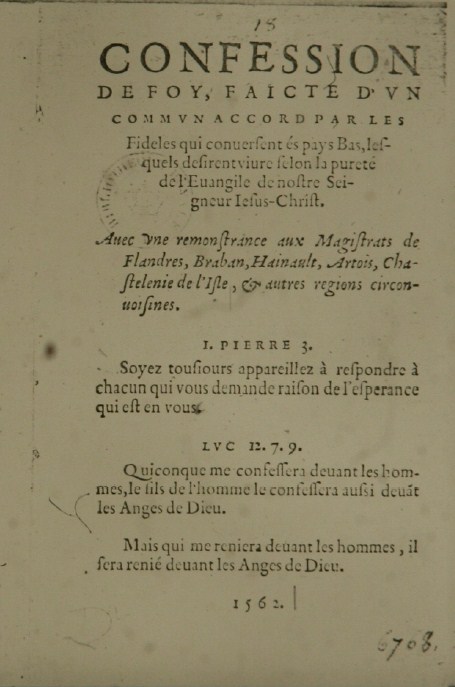1562 Editions of the Belgic Confession


While in Grand Rapids this past weekend, I did a bit of further research into the Belgic Confession. We know of two French editions from 1562. In his excellent study, N.H. Gootjes has a section discussing the differences and similarities between these two (25-28). They are very similar, with only a few minute differences. One point that Gootjes doesn’t mention is that the shorter version (“the Minor”) appears to have an advertisement on the last page for a tract containing Theodore Beza’s speech at the Poissy Colloquy. This speech was made to various royal officials on September 24, 1561. If you can read French, this is the text of the advertisement:
La seconde harangue de M. Theodore de Besze, prononce a Poissy, en la presence de la Roine mere, les Roy & Roine de Navarre, & autres grans Princes & Seigneurs du Conseil du Roy, presens Messieurs les Cardinaux, Prelats & Docteurs. Le vingtquatrieme iour du mois de Septembre 1561. Responsive a l’oraison de Monsieur le Cardinal de Lorraine.
This was an appeal for the French government to make room for Reformed believers. At the conclusion of the speech, Beza presented the 1559 French (or Gallican) Confession. Evidently, the printer seems to have thought that people interested in the Belgic Confession would also be interested in what Beza had to say — a reasonable assumption. If we could determine who published Beza’s speech in 1562, we might be able to also figure out who the printer was for “the Minor” 1562 edition of the Belgic Confession. Right now all that remains a mystery.



[…] Mysteries in the Text Criticism of the Belgic Confession Posted on October 26, 2009 by R. Scott Clark Wes has the clues. […]
On a side note, if I understand things correctly, Beza’s Poissy Colloquy didn’t go over so well did it? I read somewhere that it was a kind of proto Evangelicals and Catholics Together! I suspect that might a bit anachronistic, eh? lol.
How would one go about trying to figure out who printed Beza’s speech in 1562?
Brad,
Compared to many other Reformed interactions with Roman Catholics, it does come off as quite soft and conciliatory.
As for figuring out the publisher, I’m not sure. Especially if it was published in the Low Countries, it might be next to impossible. Because of persecution, printers weren’t that interested in having their names on Reformed literature.
If you can read *sixteenth-century* French. (Actually, if you can’t read French of any era, presumably it’s still the text of the announcement.) 🙂